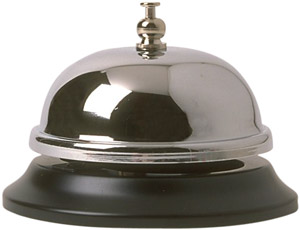Why an Ah Bell?
Jan 10
Toastmasters International has this to say about the Ah Counter:
The purpose of the Ah-Counter is to note any word or sound used as a crutch by anyone who speaks during the meeting. Words may be inappropriate interjections, such as and, well, but, so and you know. Sounds may be ah, um or er. You should also note when a speaker repeats a word or phrase such as “I, I” or “This means, this means.”
The Ah Counter tracks the number of such disfluencies used. Interestingly, Toastmasters International does not note the use of an ah bell (although they mention some clubs fine speakers a nickel for each uh or um). The ah bell is not an official Toastmasters procedure.

However, it is common in many District 55 clubs, and I feel it is very valuable.
First, it provides instant feedback. Whether talking about people or animals, the longer the delay before feedback is provided, the less benefit the feedback has. This is especially true when it comes to something so small like ums and uhs. Many speakers are surprised to hear how many they had, and find it hard to improve. The ah bell provides instant feedback that results in them noticing this poor speaking habit more, causing them to reduce their use of disfluencies faster.
There’s another benefit that is significantly less obvious. It teaches novice speakers to deal with distractions. Of course we try to create a distraction-free environment for speakers as much as possible, but in any speaking situation, things happen. The power goes out, someone’s cell phone goes off, PowerPoint stops working, someone gets up and leaves the room, a chair squeaks very loudly, a group gets rowdy on the other side of the wall. A speaker must maintain their poise and command of the situation, regardless of what is happening. When hearing the ah bell, an inexperienced speaker will often be thrown off. They’ll forget their message and won’t think about the ah bell. With a little experience, they will learn to keep their focus. They might choose to respond to a distraction, possibly by making a humorous comment or working it into their message, or they might ignore it, but either way they will keep going and will not forget what they were trying to say. The same skills they use to deal with the bell are the skills they use when dealing with other distractions.
you don’t have to ring the ah bell for everyone, however. Some clubs have a policy of not ringing the bell until a speaker has at least given their icebreaker, for example.
Note: although an old-fashioned service bell is most commonly used, there are many bell or soundboard apps for smartphones and tablets that can do just as well. And of course, it doesn’t need to be a bell, strictly speaking; any audible signal can be suitable.
Your club should most definitely have an Ah Counter, as Toastmasters International recommends. Does your club need an ah bell? That’s for your club to decide. They don’t have to, but I hope you’ll consider these points and how use of an ah bell can benefit your club.

 Blog RSS Feed
Blog RSS Feed